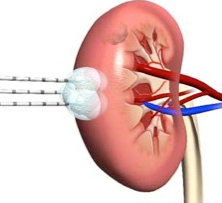Scientific Editor: Editorial Board ISUD website
- What are Cryotherapy and Radiofrequencies for renal tumors?
- When are they indicated for renal tumors?
- What sort of preparation is needed?
- How are the procedures performed?
- What about after the procedures?
- How do they affect the patient’s life?
What are Cryotherapy and Radiofrequencies for renal tumors?
Cryotherapy is a minimally invasive method for the ablation of renal tumors, by using medical ice to freeze the tumor site, in order to maintain function of the remaining kidney. In contrast to Cryotherapy, Radiofrequencies are high-frequency alternating current applied on the tumor site to destroy tissue through high temperatures.
When are Cryotherapy and Radiofrequencies indicated for renal tumors?
Cryotherapy and Radiofrequencies are applied to treat small renal tumors in patients with severe health problems who are poor candidates for surgery (nephrectomy).
What sort of preparation is needed?
The standardized preoperative preparation is carried out in hospital.
In case you take anticoagulants, you should inform your doctor.
How are the procedures performed?
Cryotherapy requires general anaesthesia, with the patient sleeping throughout the operation. It may be open surgery with an incision or, more frequently, laparoscopic with the use of a camera. Small holes are opened in the skin, through which cool-tip electrodes pass into the tumor with ultrasound- or CT-guidance. These cryo-electrodes freeze the tumor by forming an ice ball.
Radiofrequencies take place with CT guidance; cryo-electrodes pass into the tumor to destroy it, by elevating high local temperatures.
For patients treated with Cryotherapy, the average length of hospital stay is 3 days. When applying Radiofrequencies, hospital stay is even shorter.
What about after the procedures?
When discharged from hospital, you will be given specific instructions.
- If you had been taking anticoagulants before, you will be informed about when to start them again.
Also, you will be instructed:
- when to start intense physical exercise
- what kind of postoperative antibiotic treatment will be required
- whether you should be followed up by an Oncologist
How do they affect the patient’s life?
It will take you at least 10-14 days to fully recover and at least 2-4 weeks before fully resuming to your previous activities.
As there is some tumor recurrence risk, you are advised to have regular follow-up CT scan evaluation.
In addition, it is necessary to check renal function with blood tests or/and nephrogram (renogram).


